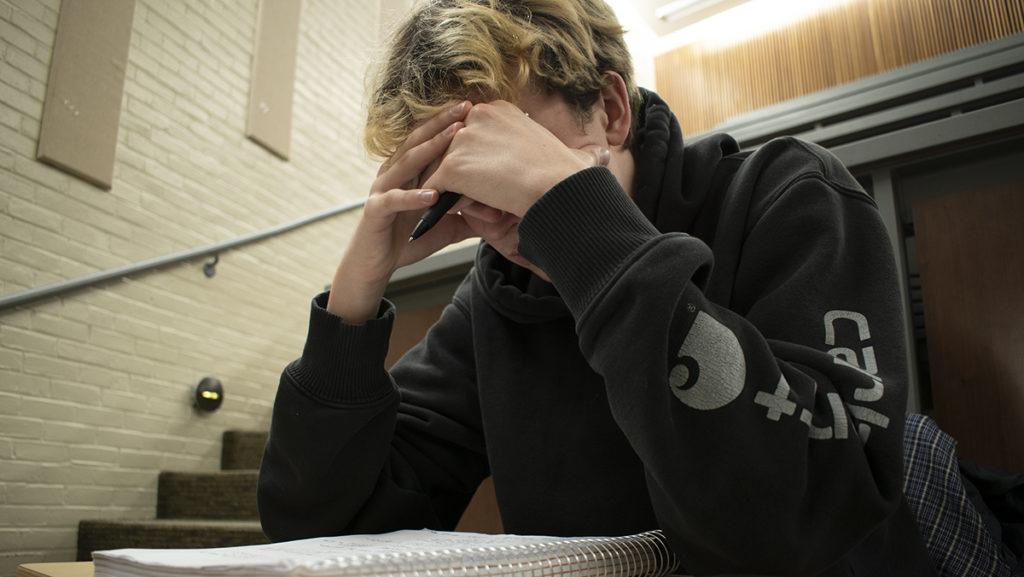In the wake of the COVID-19 pandemic, faculty members at Ithaca College are working to support students’ education and mental well–being as well as their own, with a growing focus on trauma-informed teaching.
To be trauma-informed is to recognize that everyone may be holding trauma and to actively support control, choice and autonomy, therefore avoiding retraumatization. While trauma-informed practices are often associated with caregiving professions, educators have started to apply it to learning environments. As mental health struggles increase as a result of trauma from the COVID-19 pandemic, institutions like the college have implemented extra support and training. A study on student mental health by the American College Health Association found 60% of students indicated that the pandemic has made it more difficult to access mental health services and relative to Fall 2019, the prevalence of depression increased in Spring 2020.
Brian Petersen, director for Center for Counseling, Health and Wellness (CAPS), said trauma can result from feelings of lack of control and trauma-informed practices help bring that control back to an individual.
“COVID came along and just kind of blew up everybody’s sense of what’s normal and how the world is supposed to work and it removed this sense of safety,” Petersen said. “I think COVID really challenges people’s perceptions of what they can control and what they can’t control and that extra anxiety, that extra fear, makes people struggling with trauma have a more difficult time.”
Even before the pandemic, students reported high levels of mental health struggles. In a 2018 ACHA survey of college student health, 54% of students said three or more areas of their life in the past 12 months had been traumatic or very difficult to handle. About 52% of respondents that took the college Campus Climate Survey, conducted in Fall 2016, said mental health has impacted their learning, working or living activities at the college. Students have been feeling like a lack of resources is an ongoing issue at the college.
Mandi Zucker, affiliate in the Office of Religious and Spiritual Life, is the founder and CEO of Inner Harbor, a program that supports grieving students. Since Fall 2021, the college has been in partnership with Inner Harbor to provide ongoing grief support and education for staff, faculty and students. Zucker said it is important for everyone to assume others are struggling which will help raise the level of empathy and care for students and faculty on campus.
Zucker works with grieving students, but she said any kind of change is a loss that causes some level of grief. She said just going to college can be a loss for some students and losing seemingly small things like the smell of their house, laundry detergent or favorite food can be a trigger for these feelings.
“Teachers are in such an amazing position to be able to model vulnerability for students … to say, ‘You know, this is hard to talk about, it’s hard for me to talk about, you know, how are you guys doing?’” Zucker said. “It doesn’t have to be because we’re talking about trauma. It could be in an accounting class. You never know what’s triggering for one person and it might not be triggering for another person.”
Sophomore Will Regalado Succop said he is currently taking a class where he is assigned many upsetting books to read, and while he finds the perspective of struggle important to reflect on, content warnings are necessary to include when teaching.
“I think that in artistic fields and literary fields, art is often the product of trauma or a way to work through suffering,” Regalado Succop said. “So, specifically in fields like that, it would be especially important to make sure that … they’re [students] at the very least aware of the kind of things that they’re going to be exposed to.”
One way Zucker said professors can bring trauma-informed practices to the classroom is simply by giving students a heads up of possibly sensitive or triggering content like abuse, neglect and death. The next step, she said, is to talk with students about some of the strategies that they may need to use in the classroom like allowing space for frequently checking in, taking breaks and offering for students to leave if necessary.
“The reality is, we’re all going through huge losses right now with COVID,” Zucker said. “I don’t know anyone that’s not grieving something at this point. So, even the people that look like they’re doing OK deserve to be honored for the trauma and loss that they’ve been through.”
In early March, Melodie Kolmetz, director of didactic education and assistant professor in the Physician Assistant Program, co-taught a one-time course for faculty on trauma-informed teaching. The course covered how to implement specific trauma-informed educational practices designed to meet the social and emotional needs of learners and learn responsive educator behaviors.
“Assume that everyone has had trauma,” Kolmetz said. “It’s safe to assume that now, because pretty much everybody that’s lived through COVID. That’s a traumatic experience in and of itself.”
Another way in which the college has begun to adopt trauma-informed practices on campus is by partnering with the JED Foundation (JED) at the start of the pandemic in Spring 2020. Through this partnership, the college has implemented various plans aimed at supporting mental health on campus. Ryan Bunts, JED coordinator for the college, said the foundation has been looking extensively into the impacts of COVID-19 on students’ mental health since the start of the pandemic.
“A lot of people, I think, thought it would just go back to normal once the pandemic started slowing down, but there is a lot of PTSD, a lot of trauma, and that really affects your ability to succeed academically,” Bunts said. “You can’t focus on your classes if you have higher needs that aren’t being met.”
Regalado Succopo said he thinks the support system that exists for students and faculty should be more diverse in order to fully accommodate the campus community’s needs.
“I’m a cis white guy, so I can talk to anybody and they’ll get it,” Regalado Succopo said, “Each individual struggle is very unique and needs to be treated by or addressed by someone who can really understand that.”
While there is significant work being done to accommodate the growing need for mental health services and accomodations, Kolmetz said there is a lack of support for faculty trauma.
“I would like students to understand or at least entertain the idea that it’s not just students that have trauma; faculty members are experiencing many of the same things that learners are experiencing,” Kolmetz said. “We have barriers and challenges as well. So I feel like it should be a working partnership, and a two way street so that we can make sure that everyone is successful.”
JED works extensively to support students, and Bunts said the foundation is currently developing resources for the different needs of faculty and staff on campus. He said there are unique challenges for both positions and in the near future JED hopes to have more in place to support employees.
“One of the fundamental issues is that JED is a very student-focused organization,” Bunts said. “Our mission is focused on young adults but we also acknowledge for faculty and staff, if their own mental health is suffering, then how are they supposed to help support the mental health of another person?”









